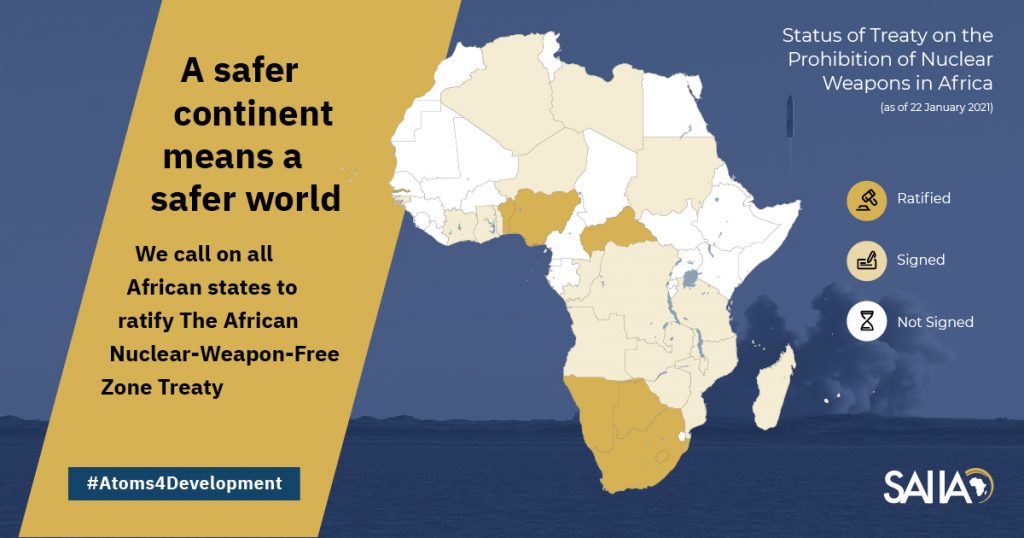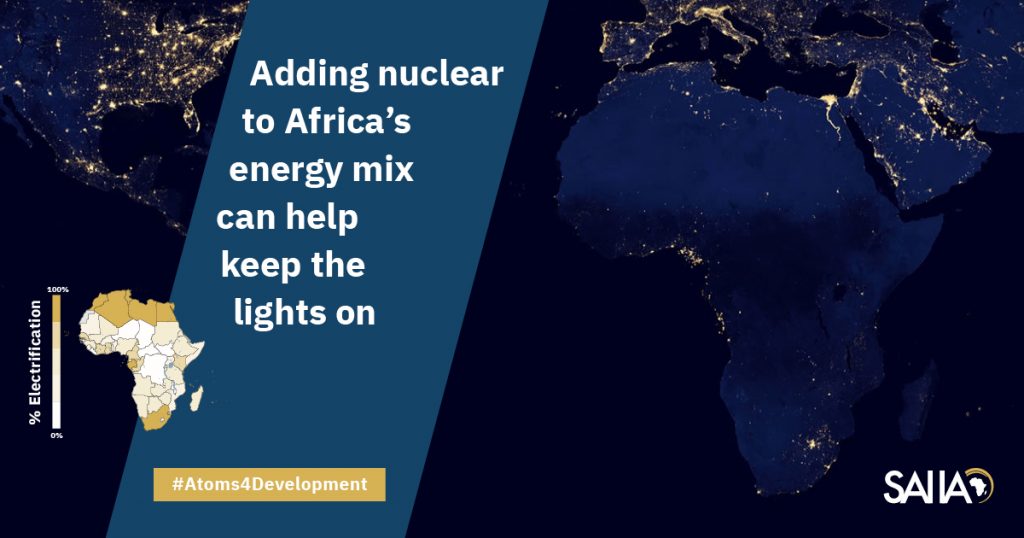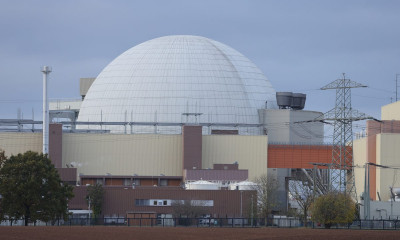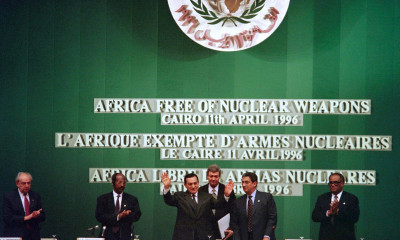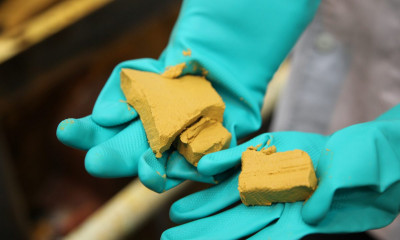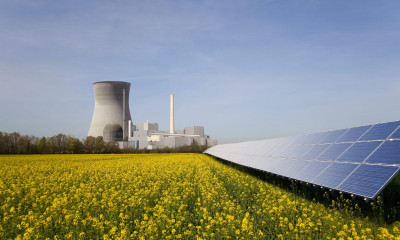Campaign background
The Atoms for Development advocacy campaign has been kick-started with the following in mind:
- Article IV of the Treaty on the Non-Proliferation of Nuclear Weapons (NPT) asserts the right of all states to the peaceful use of nuclear technology.
- Nuclear technology can make a significant contribution to socio-economic development and the attainment of the Sustainable Development Goals in Africa.
- Many African states are currently working with international institutions and other countries (in the North and South) with nuclear expertise to develop peaceful nuclear programmes
- Many African countries possess natural resources required for nuclear energy, such as uranium, plutonium, thorium, zirconium and others. These natural resources need to be extracted in a responsible and transparent manner.
- It is necessary to ensure the safe and secure handling of nuclear material, plants, reactors & waste disposal, of all existing and new nuclear programmes in Africa
- A credible, robust nuclear non-proliferation regime is essential for the peaceful use of nuclear energy.
- Civil society and the media in Africa should have greater insight into the commitments that African governments have made under the NPT and the Pelindaba Treaty, and hold them accountable
- African states should report, regularly and in a transparent manner, on their nuclear activities to the International Atomic Energy Agency (IAEA)
Watch the video:
Key messages for strengthening the African Commission on Nuclear Energy (AFCONE):
- AFCONE, as the Pelindaba Treaty Body, needs to be strengthened to ensure nuclear governance compliance and oversight at national and continental level in Africa intuitions. This includes the allocation of additional human resources to the Secretariat, including ICT personnel to complete and maintain its website.
- All State Parties to the Pelindaba Treaty are urged to honour their financial obligations towards the budget of AFCONE, as adopted by the 4th Conference of States Parties (March 2018), including clearing of the arrears backlog, in order to enable the Commission to effectively and consistently implement its programme of work.
- All 55 African Union members should become signatories to the Pelindaba Treaty. There are already 42 State Parties, with a further 12 which have signed but not yet ratified the Treaty. All AU members are urged to sign and ratify the Treaty without delay.
- International partners (UN Security Council P5 and Spain), are urged to sign and ratify Protocols I, II and III (where applicable and where they haven’t already done so) without any reservations and without further delay.
- All State Parties to the Pelindaba Treaty should support AFCONE Secretariat in implementing its vision and programme of work, through timely submissions of mandatory annual reports, as well as sharing of national expertise and infrastructure related to nuclear science and technology.
- Cooperation between AFCONE and the IAEA should be strengthened beyond the existing Practical Arrangements (PAs) between the two institutions. The workplan that is currently being prepared by AFCONE and IAEA is a welcome step in this direction.
- Cooperation between AFCONE and the Forum for Nuclear Regulatory Bodies in Africa (FNRBA) should be strengthened, as per the current discussions between these institutions and IAEA, to jointly ensure implementation of the Pelindaba Treaty provisions related to radiation and nuclear safety.
- AFCONE and African Regional Cooperative Agreement for Research, Development and Training related to Nuclear Science and Technology (AFRA) should, as soon as possible, sign the Memorandum of Understanding, as discussed and decided during the 31st Technical Working Group Meeting in July 2020, to ensure synergy and optimise available resources.
Key messages for strengthening Africa continental institutions, which have a role in nuclear governance:
- The African Union Peace and Security Council (AUPSC) should have a standing item on nuclear developments on the continent on their agenda
- The Pan-African Parliament (PAP) could and should play a bigger role in monitoring country level compliance with the Pelindaba Treaty during its sessions.
- The African Peer Review Mechanism (APRM) should include monitoring compliance of its members with the Pelindaba Treaty during its country reviews.
- The African Union Development Agency (AUDA-NEPAD) should include the peaceful use of nuclear energy on its developmental agenda.
- The Secretariat of the African Continental Free Trade Agreement Area should have a dedicated directorate on investment in the nuclear energy sector on the continent
- The AU’s Pan-African University should be involved in the training of the continent’s future nuclear experts and the development of the peaceful use of nuclear energy in Africa
Country-level recommendations:
Egypt:
- The decision-making processes surrounding the nuclear power plant in Egypt should be more transparent and inclusive. Discussions and debates about the project need to incorporate a larger number of stakeholders from Egyptian society, including detractors.
- Nuclear technological processes – and their potential failures – should be discussed more openly and critically in Egypt. The current approach of technological fetishism may result in blindness towards accidents and risks, thereby maintaining vulnerability.
- The questions raised about the feasibility and necessity of the nuclear project in Egypt – particularly due its large cost – should be considered by other African states considering their nuclear options.
South Africa:
- South Africa should only pursue future nuclear energy expansions if these provide a financial advantage over other energy options.
- Public education on nuclear energy in South Africa should be conducted continuously.
- State-owned entities, such as power utility Eskom and the South African Nuclear Energy Corporation (NECSA), should not be reliant on government funding. This will improve their performance and financial viability.
- The South African 2008 Nuclear Energy Policy needs to be reviewed, revised and updated, to take into account new realities, including costs of nuclear energy, impact of COVID-19, domestic and international changes in the nuclear sphere, and to address the shortcomings identified by the International Atomic Energy Agency (IAEA) Integrated Nuclear Infrastructure Review (INIR) in 2013.
- A follow-up International Atomic Energy Agency (IAEA) Integrated Nuclear Infrastructure Review (INIR) mission to South Africa needs to take place to assess the state of the implementation of its recommendations, as well as make new recommendations to further improve nuclear governance.
- In South Africa, a skills audit needs to be conducted to determine the state of nuclear energy training and education in the country. The audit should include an assessment of existing national and inter-governmental training programmes.
Watch the video:
View the infographics
